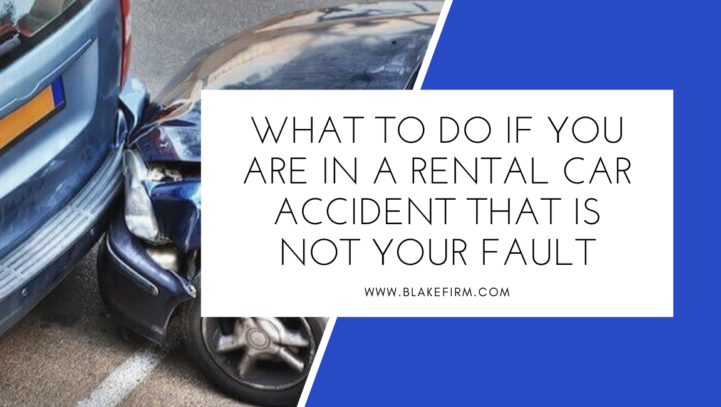What to Do If You Are In a Rental Car Accident That is Not Your Fault
What happens when you rent a car on vacation and another car hits you? The first steps won’t be very different than the protocol for an ordinary accident in your own vehicle. You’ll need to notify law enforcement right away and seek medical attention if necessary, followed by communicating with your insurance agency.
If you were injured and need help with your medical bills or other accident-related expenses, you may be able to recover damages after your accident. Having the information you need for this process will save you time and money. In some cases, speaking with a personal injury lawyer will be necessary after a car accident injury.
How to Handle an Accident in a Rental Car
- Calling the police should be your first step after an accident, followed by seeking medical attention
- Hold onto all of your medical records and a copy of the police report filed at the accident
- You can potentially recover compensation to help you pay for damages
- In some cases, working with a personal injury attorney will be helpful for securing maximum compensation
If you’ve been in a rental car accident that was not your fault, you should take pictures after calling the police and your insurance company. It may not seem very important immediately following an accident, but photos will help you prove (if necessary) that the other driver was at fault in the collision.

Your Insurance Company
When you talk to your insurance company, ask them whether you need to file the police report or whether they will do it for you. Your rental car may or may not have been covered under your policy, depending on the type of coverage you have. When you’re speaking with your insurance company, ask them what the deductible (amount you pay out of pocket) will be to repair the car.
The Rental Car Company
Let your rental car company know about the incident as soon as you’re able. They will know the next necessary step for handling the damaged vehicle. If you only had liability coverage and didn’t get an extra policy from the rental car agency, you might have to cover the entire amount of damage to the car. However, if the accident wasn’t your fault and the at-fault driver had coverage, there should be little to no financial damages to cover.
How to Prove an Injury
Receiving the full amount you deserve for accident-related damages will involve showing your medical treatments, records, doctor’s prognosis, lost income, potential long-term medical expenses, and pain and suffering. This will require negotiation with the insurance companies involved. If applicable, supplying witness testimony can help your case, so it’s always a good idea to ask for contact information from anyone who saw the accident.
Medical records are the most reliable way to show how injured you were by the incident. Pictures of your injury can also help you prove the extent of damage suffered and, as a result, the compensation you’re entitled to.
Gather Information
Exchange personal information with the other driver(s) and, if possible, refrain from mentioning that you were driving a rental car. In some cases, drivers will attempt to take advantage if they know the accident didn’t affect your personal vehicle. If the accident was serious enough to require police at the scene, ask an officer for a copy of the citation or the police report they made. This will help you prove the circumstances of the accident to the insurance company later.
FAQ on Car Insurance Laws in Arizona
Here are some common questions regarding vehicle insurance laws in the state:
Q: What is Arizona’s law on mandatory liability insurance?
The state requires each vehicle in use on Arizona roads to have liability insurance coverage through an authorized agency. This applies not only to trucks and cars but mopeds, motorcycles, and even golf carts. The minimum coverage amounts for liability are $10,000 for property damage, $15,000 for death or bodily injury, and $30,000 for death or total bodily injury liability.
Q: Does Arizona use a no-fault or fault-based system for car insurance?
In no-fault states, everyone involved in a car accident must submit claims to their insurance agencies, whether or not the collision was their fault. However, Arizona uses a fault-based system, meaning the person responsible for the accident must cover the damages. The state law allows injured people to file their claims directly with the insurance company of the at-fault driver.
Q: What are the penalties for driving without insurance coverage in Arizona?
If you’re caught driving without insurance coverage, you may have your driver’s license or vehicle registration suspended. You’ll also have to pay fees and present the state Motor Vehicle Department with proof of financial responsibility. However, if you get in a car accident with no insurance, the consequences will be more severe.
What to Do if You’ve Been Injured in Arizona
If you’ve been in a motor vehicle accident, calling 911 should be the first step you take. Even if you aren’t sure whether or not you’ve been injured, it’s always a good idea to seek medical attention. Some injuries won’t show up until later and a physician can give you a general idea of what to expect. Many drivers make the mistake of assuming they aren’t injured and signing a release of liability form, then finding that they can’t seek compensation to cover their delayed injuries.
Exchange insurance and contact info with the other driver(s) involved. Refrain from avoiding medical attention, making statements about the accident to the other driver’s insurance company, or taking money from the other driver. You also need to consider protecting your rights by speaking with an attorney after you’ve been in an accident.
Oftentimes, insurance companies don’t get you enough money to cover your medical costs after an accident. When you speak with a skilled personal injury attorney, they can go over the agreements at hand and let you know if you’ve been improperly billed and whether you should receive more compensation for your medical expenses.



